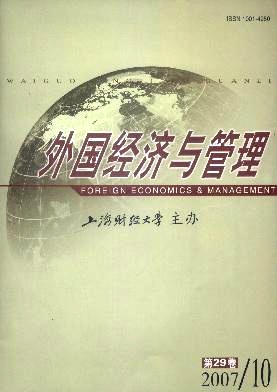西方跨文化培训设计研究评介
外国经济与管理 2007 年 第 29 卷第 10 期, 页码:39 - 46
摘要
参考文献
摘要
文化冲突是影响跨国经营成败的关键因素。在多文化的背景下,跨国企业的外派工作需要具备较高跨文化技能的外派人员来完成,而跨文化培训是提升外派人员跨文化技能的有效途径。本文在梳理西方跨文化培训相关研究文献的基础上,对跨文化培训设计(培训方式、内容和模型)进行了评述和分析,并指出了我国跨国企业在跨文化培训方面与西方的差距。
[1]Landis,D,and Brislin,R.Handbook of intercultural training[M].NY:Pergamon,1983:25-39.
[2]Kim,P S,and Ofori-Dankwa,J.Utilizing cultural theory as a basis for cross-cultural training:Alternative approaches[J].PublicAdministration Quarterly,1995,18(4):46-79.
[3]Bhawuk,D P S,and Brislin,R.Cross-cultural training:A review[J].Applied Psychology:An International Review,2000,49(1):162-191.
[4]Caligiuri,P,Phillips,J,Lazarova,M,Tarique,I,and Burgi,P.The theory of net expectations applied to expatriate adjustment:The role of cross-cultural training[J].International Journal of Human Resource Management,2001,12(3):357-373.
[5]Rosalie L Tung.A contingency framework of selection and training of expatriates revisited[J].Human Resource Management Re-view,1998,8(1):23-37.
[6]J K Harrison.Developing successful expatriate managers:A framework for the structural design and strategic alignment of cross-cul-tural training programs[J].Human Resource Planning,1994,17(3):17-35.
[7]Walton,S J.Stress management training for overseas effectiveness[J].International Journal of Intercultural Relations,1990,14:507-527.
[8]Brislin,R W.Orientation programs for cross-cultural preparation[M].New York:Academic Press,1979:68-90.
[9]Chatman,J A,and Flynn,F J.The influence of demographic heterogeneity on the emergence and consequences of cooperative normsin work teams[J].Academy of Management Journal,2000,44(5):956-974.
[10]Hogan,G W,and Goodson,J R.The key to expatriate success[J].Training and Development Journal,1990,44(1):50-52.
[11]Mark Mendenhall,Betty Jane Punnett,and David Ricks.Global management[M].Cambridge,Massachusetts:Blackwell Publish-ers,1995:450.
[12]Osland,J S,and Bird,A.Beyond sophisticated stereotyping:Cultural sense-making in context[J].Academy of Management Exec-utive,2000,14(1):65-79.
[2]Kim,P S,and Ofori-Dankwa,J.Utilizing cultural theory as a basis for cross-cultural training:Alternative approaches[J].PublicAdministration Quarterly,1995,18(4):46-79.
[3]Bhawuk,D P S,and Brislin,R.Cross-cultural training:A review[J].Applied Psychology:An International Review,2000,49(1):162-191.
[4]Caligiuri,P,Phillips,J,Lazarova,M,Tarique,I,and Burgi,P.The theory of net expectations applied to expatriate adjustment:The role of cross-cultural training[J].International Journal of Human Resource Management,2001,12(3):357-373.
[5]Rosalie L Tung.A contingency framework of selection and training of expatriates revisited[J].Human Resource Management Re-view,1998,8(1):23-37.
[6]J K Harrison.Developing successful expatriate managers:A framework for the structural design and strategic alignment of cross-cul-tural training programs[J].Human Resource Planning,1994,17(3):17-35.
[7]Walton,S J.Stress management training for overseas effectiveness[J].International Journal of Intercultural Relations,1990,14:507-527.
[8]Brislin,R W.Orientation programs for cross-cultural preparation[M].New York:Academic Press,1979:68-90.
[9]Chatman,J A,and Flynn,F J.The influence of demographic heterogeneity on the emergence and consequences of cooperative normsin work teams[J].Academy of Management Journal,2000,44(5):956-974.
[10]Hogan,G W,and Goodson,J R.The key to expatriate success[J].Training and Development Journal,1990,44(1):50-52.
[11]Mark Mendenhall,Betty Jane Punnett,and David Ricks.Global management[M].Cambridge,Massachusetts:Blackwell Publish-ers,1995:450.
[12]Osland,J S,and Bird,A.Beyond sophisticated stereotyping:Cultural sense-making in context[J].Academy of Management Exec-utive,2000,14(1):65-79.
引用本文
高嘉勇, 吴丹. 西方跨文化培训设计研究评介[J]. 外国经济与管理, 2007, 29(10): 39–46.
导出参考文献,格式为:
上一篇:雇主品牌研究综述
下一篇:组织适应性驱动因素探析





 6869
6869  896
896

